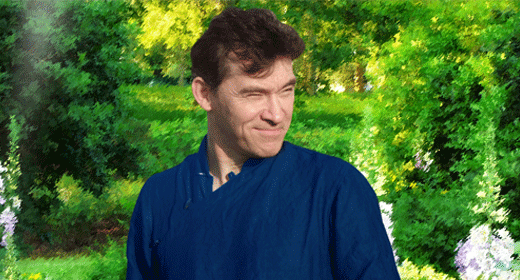Awaken: In your work, you so often speak of the importance of humility when traveling the spiritual path. Why is this so important to our spiritual growth?

St. Teresa of Avila: This virtue, and that of detachment from self, I think, always go together. They are two sisters, who are inseparable. These are not the kinsfolk whom I counseled you to avoid. No, you must embrace them, and love them, and never be seen without them. Oh, how sovereign are these virtues… so dearly loved by our teacher, Christ, who was never for a moment without them!
Awaken: But why is it so important?
Teresa of Avila: It will have the effect of greatly fortifying the soul.
There will be many things to deprive us of the holy freedom of spirit, which our souls seek in order to soar to their maker, unburdened by the leaden weight of the earth. It will be a great help towards this if we keep constantly in our thoughts the vanity of all things and the rapidity with which they pass away, so that we may withdraw our affections from things which are so trivial, and fix them upon what will never come to an end.
With regard to small things, we must be very careful, as soon as we begin to grow fond of them, to withdraw our thoughts from them and turn them to God. His majesty will help us do this. He has granted us a great favor of providing that, in this House, most of it is done already; but it remains for us to become detached from our own selves and it is a hard thing to withdraw from ourselves and oppose ourselves, because we are very close to ourselves and love ourselves very dearly. It is here that true humility can enter.
Awaken: Can you explain what you mean by Houses?
Teresa of Avila: I thought of the soul as resembling a Castle, formed of a single diamond or a very transparent crystal and containing many rooms, just as in heaven there are many Mansions.
Let us imagine, as I said, that there are many rooms in this Castle, of which some are above, some below, others at the side; in the center, in the very midst of them all, is the principal chamber in which God and the soul hold their most secret intercourse. Think over this comparison very carefully; God grant it may enlighten you about the different kinds of graces He is pleased to bestow upon the soul. No one can know all about them, much less a person so ignorant as I am.
Now let us return to our beautiful and charming Castle and discover how to enter it. This appears incongruous: if this Castle is the soul, clearly no one can enter it, for it is the person himself: one might as well tell some one to go into a room he is already in!
There are, however, very different ways of being in this Castle; many souls live in the courtyard of the building where the sentinels stand, neither caring to enter farther, nor to know who dwells in that most delightful place, what is in it and what rooms it contains.
Awaken: And if one wishes to enter farther… what is the best way?
Teresa of Avila: As far as I can understand, the gate by which to enter this Castle is prayer and meditation. I do not allude more to mental than to vocal prayer, for if it is prayer at all, the mind must take part in it. If a person neither considers to whom he is addressing himself, what he asks, nor what he is who ventures to speak to God, although his lips may utter many words, I do not call it prayer.
Sometimes, indeed, one may pray devoutly without making all these considerations… The custom of speaking to God Almighty freely—caring nothing whether the words are suitable or not, but simply saying the first thing that comes to mind from being learnt by rote by frequent repetition—cannot be called prayer.
Awaken: Could you summarize or explain the layout of the Mansion?
Teresa of Avila: …Let us turn at last to our Castle with its many Mansions. You must not think of a suite of rooms placed in succession, but fix your eyes on the keep, the court inhabited by the King. Like the kernel of the palmito, from which several rinds must be removed before coming to the eatable part, this principal chamber is surrounded by many others. However large, magnificent, and spacious you imagine this Castle to be, you cannot exaggerate it; the capacity of the soul is beyond all our understanding, and the Sun within this palace enlightens every part of it.
Awaken: You’ve explained that prayer is the way in. How does this connect with the importance of humility?
Teresa of Avila: Let humility be always at work, like the bee at the honeycomb, or all will be lost. But, remember, the bee leaves its hive to fly in search of flowers and the soul should sometimes cease thinking of itself to rise in meditation on the grandeur and majesty of its God. It will learn its own baseness better thus than by self-contemplation, and will be freer from the reptiles which enter the first room where self-knowledge is acquired.
Awaken: Let me make sure I understand… While humility is important, we shouldn’t spend too much time working on ourselves, but rather bring our focus onto God?
Teresa of Avila: Believe me, by God’s help, we shall advance more by contemplating the Divinity, than by keeping our eyes fixed on ourselves… poor creatures of earth that we are.
I do not know whether I have put this clearly; self-knowledge is of such consequence that I would not have you careless of it, though you may be lifted to heaven in prayer, because while on earth nothing is more needful than humility. Therefore, I repeat, not only a good way, but the best of all ways, is to endeavor to enter first by the room where humility is practiced, which is far better than at once rushing on to the others. This is the right road—if we know how easy and safe it is to walk by it, why ask for wings with which to fly? Let us rather try to learn how to advance quickly.
I believe we shall never learn to know ourselves except by endeavoring to know God, for, beholding His greatness we are struck by our own baseness, His purity shows our foulness, and by meditating on His humility we find how very far we are from being humble.
Awaken: You’ve said that the first House is the starting point of self-examination, but that we must not remain there. Can you summarize the other Houses… or as you refer to them, the Mansions?
Teresa of Avila: The second Mansion treats of the importance of perseverance in order to enter the last Mansion. While in this state, we continually fall into sin and rise again. God here speaks to souls through words uttered by pious people, by sermons or good books, and in many other such ways. Sometimes He calls souls by means of sickness or troubles, or by some truth He teaches them during prayer, for tepid as they may be in seeking Him, yet God holds them very dear.
Awaken: This stage sounds very trying!
Teresa of Avila: O Jesus! What turmoil the devils cause in the poor soul! How unhappy it feels, not knowing whether to go forward or to return to the first mansion! On the other hand, reason shows it the delusion of overrating worldly things, while faith teaches what alone can satisfy its cravings.
It is of the utmost importance for the beginner to associate with those who lead a spiritual life, and not only with those in the same mansion as herself, but with others who have travelled farther into the Castle, who will aid her greatly and draw her to join them.
Remember, it is of the greatest importance—the sole aim of one beginning to practice prayer should be to endure trials, and to resolve and strive to the utmost of her power to conform her own will to the will of God.
Awaken: And the third Mansion?
Teresa of Avila: The third Mansion treats of the insecurity of life in this exile and how we must walk in fear.
Awaken: What do you mean… fear?
Teresa of Avila: We are like men whose enemies are at the door, who must not lay aside their arms, even while sleeping or eating, and are always in dread lest the foe should enter the fortress by some breach in the walls.
What misery to live in this world!
We could not desist from longing and begging God to take us from it, were it not for the hope of losing it.
Awaken: Just one more reminder of how important it is not to be too attached to worldly affairs…
Teresa of Avila: Do not grieve at knowing this.
Awaken: The fourth Mansion?
Teresa of Avila: … How sweetness and tenderness in prayer differ from consolations. As these mansions are nearer the King’s dwelling they are very beautiful, and so subtle are the things seen and heard in them, that, as those tell us who have tried to do so, the mind cannot give a lucid idea of them to those inexperienced in the matter.
Awaken: Is it necessary to pass through the Houses in order?
Teresa of Avila: Apparently a person must have dwelt for a long time in the former Mansions before entering these; although in ordinary cases the soul must have been in the last one spoken of, yet there is no fixed rule, for God gives when, how, and to whom He wills—the goods are His own, and His choice wrongs no one.
I will now describe, as I promised, the difference between sweetness in prayer and spiritual consolations… This sweetness arises principally from the good work we perform, and appears to result from our labors: well may we feel happy at having thus spent our time.
We shall find, on consideration, that many temporal matters give us the same pleasure—such as unexpectedly coming into a large fortune, suddenly meeting with a dearly-loved friend, or succeeding in any important or influential affair which makes a sensation in the world. Again, it would be felt by one who had been told her husband, brother, or son was dead, and who saw him return to her alive. I have seen people weep from such happiness, as I have done myself.
I consider both these joys and those we feel in religious matters to be natural ones. Although there is nothing wrong about the former, yet those produced by devotion spring from a more noble source—in short, they begin in ourselves and end in God. Spiritual consolations, on the contrary, arise from God, and our nature feels them and rejoices as keenly in them, and indeed far more keenly, than in the others I described.
O Jesus! how I wish I could elucidate this point! It seems to me that I can perfectly distinguish the difference between the two joys, yet I have not the skill to make myself understood; may God give it me!
Awaken: I think I understand… it is all about knowing that there is nothing sweeter than pure devotion, untainted by desire of any kind… Let’s move on to the fifth House…
Teresa of Avila: The fifth continues the same subject. Practice what I advised in the preceding Mansions, then—humility, humility! for God lets Himself be vanquished by this and grants us all we ask. The first proof that you possess humility is that you neither think you now deserve these graces and consolations from God, nor that you ever will as long as you live.
Awaken: And the highest Mansions?
Teresa of Avila: We should abandon our souls into the hands of God, leaving Him to do as He chooses with us. In my opinion, when God chooses to place the soul in this Mansion it is best for it to do as advised, and then endeavor, without force or disturbance, to keep free from wandering thoughts… only making loving aspirations occasionally. Although, in this kind of prayer, the soul makes no effort towards it, yet often, for a very short time, the mind ceases to think at all.
Awaken: This sounds like the highest and most delicious state of divine love and self realization!
Teresa of Avila: In the prayer of quiet, when the water flows from the spring itself and not through conduits, the mind ceases to act; it is forced to do so, although it does not understand what is happening, and so wanders hither and thither in bewilderment, finding no place for rest.
Meanwhile the will, entirely united to, God, is much disturbed by the tumult of the thoughts: no notice, however, should be taken of them, or they would cause the loss of a great part of the favor the soul is enjoying. Let the spirit ignore these distractions and abandon itself in the arms of divine love: His Majesty will teach it how best to act, which chiefly consists in its recognizing its unworthiness of so great a good and occupying itself in thanking Him for it.
Awaken: In some spiritual traditions, renunciation… pulling away from material affairs, is embraced as a necessary path to God. Do you believe this to be true?
Teresa of Avila: As the soul better understands the Divine Majesty, it realizes more vividly its own baseness. Divine consolation shows it how vile are earthly pleasures; by gradually withdrawing from them, it gains greater self-mastery. In short, its virtues are increased and it will not cease to advance in perfection, unless it turns back and offends God. Should it act thus, it would lose everything, however high the state it may have reached.
The whole manner of life we are trying to live is making us, not only nuns, but hermits like the holy father, and leading us to detachment from all things created. I have observed that anyone whom the Lord has specifically chosen for this life is granted that favor. She may not have it in full perfection, but that she has it will be evident from the great joy and gladness that such detachment gives her, and she will never have any more to do with worldly things, for her delight will be in all the practices of the religious life… anyone whose soul pleasure lies in pleasing God and who cares for nothing but her own pleasure will find our life a very good one; if she wants anything more, she will lose everything, for there is nothing more that she can have.
A discontented soul is like a person suffering from severe nausea, who rejects all food, however nice it may be; things which persons in good health delight in eating only cause her the greater loathing.
It is like the life of a man who has satisfied his appetite and has no need of food. He feels so comfortable in his stomach that he could not sit down to ordinary fare. So the soul is dissatisfied with the world’s pleasures and does not desire them, because it has within it something that satisfies it better. Greater joy in God, a longing to satisfy its desires and more deeply to enjoy its times with him: these are what the soul seeks.
Awaken: What do you recommend to those who wish to walk a spiritual path, as the most valuable practice?
Prayer is a little spark of true love for God, which begins to kindle in the soul. This little spark is a sign or pledge that God gives to this soul to show that he is already choosing it for great things, if it will prepare it self to receive them. It is a great gift, far greater indeed than I can say.
Awaken: How do we recognize this spark and keep it lit?
Teresa of Avila: All that the soul has to do at these times of quiet is merely to be calm and make no noise. By noise I mean working with the intellect to find great numbers of words and reflections with which to thank God for this blessing, and piling up at sins and faults to prove to itself that it does not deserve it. Then the commotion starts, the intellect works and the memory seats. Indeed these faculty sometimes tire me out, for though I have very little memory, I cannot keep it under control.
Awaken: It’s challenging, as we want to hold onto, and talk about these experiences…
Teresa of Avila: If the wish is to inform the intellect of the nature of its joy, or strives to bring it into recollection, it will not succeed. It will often happen that the intellect will be in great disorder. But one had better leave it alone and not run after it… remain in the enjoyment of that grace. For, if no bees entered the hive and all flew about trying to bring one another in, there could not be much honey made!
Awaken: So, union with God is the highest form of being and enlightenment for a human… Yet, there seems to be no adequate word that corresponds to what you speak of as the greatest joy. Is it possible to explain further?
Teresa of Avila: The soul’s humility is now greater and more profound than it was before. It Clearly sees that it has done absolutely nothing except consent to the Lord’s granting of graces. The virtues then, are now stronger than they were during the preceding prayer of quiet. The Soul sees that it has changed, and is unconsciously beginning to do great things with the fragrance given off by the flowers. It is now the Lord’s will that they shall open, so that the Soul may see that it possesses virtues, even though it also knows very well that it cannot and never could acquire them in many years, whereas the celestial Gardner has given them to it in a flash. This state of prayer seems to me a most definite union of the whole soul with God.
Awaken: It also sounds like you are speaking of something like what the Yogis call seva… Bringing the spiritual fruits into the world through things like goodwill and charity?
Teresa of Avila: In the first state, the soul does not wish to move or stir, but delights in the blessed repose of a Mary… Thus it is leading to… and can apply itself, to works of charity, to its professional business and to reading, as well.
Awaken: Could you share any of your personal experiences with prayer?
Teresa of Avila: I was indeed amazed, and understood it all in a flash. Very often I was, so to speak, bewildered and intoxicated with love, and yet could never understand how it was. I knew very well that this was God’s work, but I could never understand the way in which he worked here.
The pleasure, sweetness, and delight are incomparable… for the water of grace has risen to the soul’s neck, and it is powerless, not knowing how to advance nor to retreat; what it wants is to enjoy its very great glory. It is like a man with the funeral candle in his hand, on the point of dying the death he desires. It takes delight in the enjoyment of its agony, which seems to me like nothing else but an almost complete death to all the things of this world, and a fulfillment in God.
I know of no other words with which to describe or explain it. The soul does not know what to do; it cannot tell whether to speak or be silent, whether to laugh or weep. It is a glorious bewilderment, a heavenly madness, in which true wisdom is acquired, and to the soul a fulfillment most full of delight.
Awaken: Could you also describe one of your visions, which you have spoken of before?
Teresa of Avila: One day, when I was at prayer… it was the feast day of the glorious Saint Peter… I saw Christ at my side… Or, to put it better, I was conscious of him, for I saw nothing with the eyes of the body or the eyes of the soul. He seemed quite close to me, and I saw that it was He. As I thought, he was speaking to me. Being completely ignorant that such visions were possible, I was very much afraid at first, and could do nothing but weep, though as soon as he spoke, his first word of assurance to me, I regained my usual calm, and became cheerful and free from fear.
All the time, Jesus Christ seemed to be at my side, but as this was not an imaginary vision, I could not see in what form. But I most clearly felt that he was all the time on my right, and was a witness of everything that I was doing. Each time I became a little recollected, or was not entirely distracted, I could not but be aware that he was beside me.
Awaken: Did it ever happen that you were not taken seriously about these matters?
Teresa of Avila: In deep distress, I left the church and went into an oratory. For many days, I had not taken communion and had refrained from seeking solitude, which was my chief comfort. I had no one to discuss matters with, since they were all against me. When I spoke to them about my experiences, I thought they were mocking me, as if it were all my fancy. There were some who said that it was clearly “the devil’s work.” Only my confessor constantly comforted me, although he took their side. This, as I afterwards learned, was in order to test me. He told me that even if it were the devil, my prayer could do me no harm, as long as I did not offend against God.









































